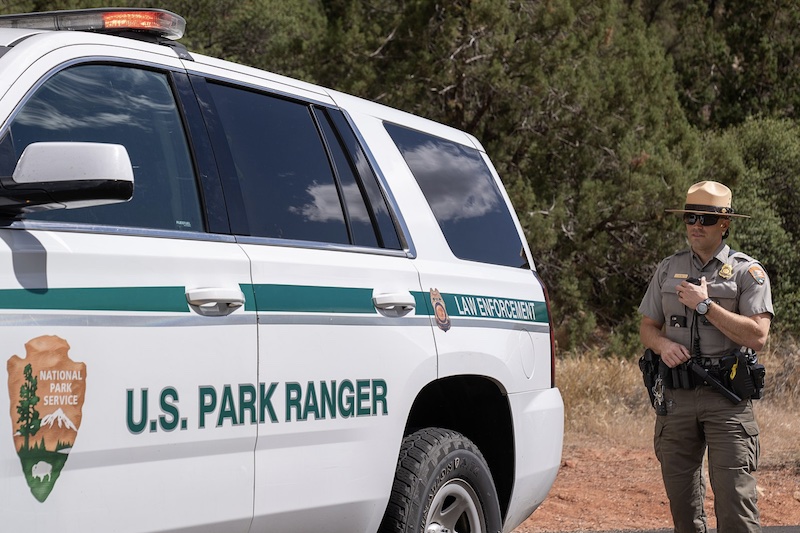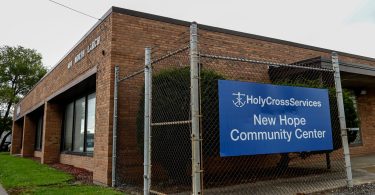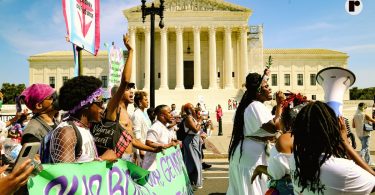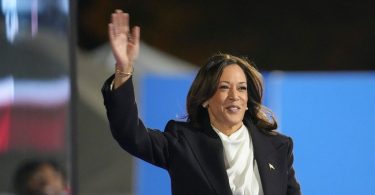An NPS ranger in Zion Canyon – Photo: National Park Service/Jonathan Shafer.
The National Park Service is enforcing guidelines on ranger participation in events that effectively ban employees from participating in LGBTQ Pride events.
In a May 9 memo sent to the agency’s nearly 20,000 employees, first obtained by E&E News, NPS Deputy Director Frank Lands said the National Park Service had received “an increasing amount of requests from employees asking to participate in uniform in a variety of events and activities, including events not organized by the NPS, which potentially conflict with our uniform policy.”
NPS internal memos and documents reveal that the agency is seeking to enforce existing guidelines that prohibit employees from participating, in uniform, in any events that “could be construed as agency support for a particular issue, position, or political party.”
Additionally, the current guidelines prohibit all ornaments — rainbow-colored pins, ribbons, or buttons, for example — except the NPS-issued badge, name bar, American flag pin, and collar insignia, from appearing on ranger uniforms.
The NPS, which oversees the country’s various national parks and monuments, marks a departure from how the agency has enforced the policy, especially with respect to LGBTQ Pride, which critics of this latest interpretation claim is a celebration of identity and not a political cause or issue, as conservatives typically claim.
In addition to Lands’ memo clarifying existing policy, the NPS also circulated a follow-up question-and-answer document and a subsequent email to staff in order to ensure compliance.
In that Q&A document, the NPS answered the question: “Isn’t a Pride event more related to identity than a political issue or cause?”
“When analyzing First Amendment concerns, the courts do not make a distinction between events which celebrate or support an ‘identity’ and events which advocate for a ’cause,’” the document reads. “When analyzing Parades and similar events are seen as a form of communication, both for the organizers and participants, so participation by uniformed employees would be viewed as communication on behalf of the NPS.”
In the follow-up email, Lands stated that “uniformed participation in any non-NPS event is viewed as official communication on behalf of the NPS and therefore on behalf of the United States government.”
However, he said the policy clarification does not affect scheduled in-park events, and noted that there was no directive to cancel any events planned to celebrate Pride Month.
“Simply put, no policy has changed,” Lands wrote. “We sent the reminder because more and more employees are now asking to participate in uniform in non-NPS events that support a wide variety of topics and causes. Previous interpretations of our uniform policy were inconsistent and did not receive the comprehensive review we are currently working through.”
The NPS has previously permitted uniformed rangers to participate in LGBTQ Pride marches, and has allowed rangers for the Stonewall National Monument, the New York City NPS site marking the site of the 1969 uprising at the Stonewall Inn to participate in Pride-themed events in uniform.
An NPS spokesperson told NBC News in an email that “official NPS participation in events that directly relate to a park’s mission can be approved by the park superintendent, provided it is consistent with applicable laws, rules, regulations, and NPS policies.”
On face value, such an exception would appear to apply to any official LGBTQ-themed events held at the Stonewall National Monument.
But internal NPS emails obtained by NBC News show a lack of clarity around what constitutes an acceptable exception, and whether park superintendents can actually approve requests on their own. Emails from various park superintendents show them saying they must request approval from their managers for waivers before such requests are approved.
The timing of the NPS policy clarification has also raised suspicion among some LGBTQ NPS employees, given that it comes at a time when LGBTQ visibility has come under attack. More than 500 bills have been introduced in various legislatures seeking to restrict transgender rights or deny recognition to transgender identity; to reduce LGBTQ visibility in the public square; and censor any mentions of, or books about, LGBTQ history or identity in classrooms and public libraries.
At the same time, federal law enforcement agencies and the State Department have warned that terrorists could target large-scale events celebrating Pride Month.
Several jurisdictions have sought to ban celebrations of Pride or displays of LGBTQ identity, while other LGBTQ events have been disrupted by threats of violence or protests from right-wing groups who claim LGBTQ people are attempting to “recruit” or “groom” children.
One disgruntled NPS staffer, who spoke to NBC News on condition of anonymity, said they were “appalled” by the agency’s “lack of professionalism” and clumsiness in handling the policy clarification.
That employee argued that NPS participation in Pride events was important because it honors the thousands of federal LGBTQ employees who were fired or forced to resign during the “Lavender Scare,” a period during the two decades following World War II when there were concerted efforts to purge LGBTQ people from the federal government due to concerns they were “security risks” or vulnerable to blackmail by foreign agents.
“I see Pride as a key service to the public, and I see stepping away from that as a political statement,” the employee said. “I see denying this decades-long tradition as cowardly, and I see it as validating the far-right provocateurs who are trying to push into political discourse whether or not queer people can exist.”







